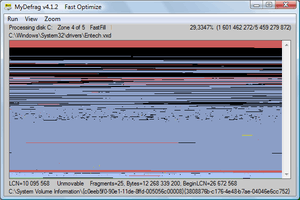MyDefrag
 | |
| Original author(s) | Jeroen Kessels |
|---|---|
| Stable release | 4.3.1 (May 21, 2010) [±] |
| Development status | Unmaintained |
| Written in | C++ |
| Operating system | Windows 2000/XP/2003/Vista/7/8/8.1/10 |
| Type | Defragmentation utility |
| License | Freeware |
| Website | mydefrag.com (Archived) |
MyDefrag (formerly JkDefrag) is a freeware disk defragmenting utility for Windows. JkDefrag was developed by Jeroen Kessels from 2004.[1] The major change between JkDefrag and MyDefrag is the inclusion of a scripting language. This permits control of all the algorithms and techniques used in MyDefrag. A number of pre-written scripts intended for common usage scenarios are included, such as those for system hard disks, data hard disks, solid state media, consolidation of free space, fast or thorough defragmention, and the ability to lay files out on disk exactly where required, sorted by filename, access time, size, etc. The scripts provided cater for the usual tasks; but while scripts offer great flexibility, any task not covered by an existing script (an example given in a review: defragging only movie files over 50 meg which have not been accessed since last year) requires the user to write the required script, not simple for a novice.[2]
A feature unique to MyDefrag is wrap-around fragmentation, which, when enabled by default, will surround unmovable sectors with otherwise defragmented data. This is done to minimize the number of empty gaps between files and to load more data into the faster regions of hard disks.[3] MyDefrag has a graphical user interface, which can be used to load and monitor scripts. Scripts designed for use on system disks will use prefetch data present in Windows about the most commonly used files in order to optimize boot and program performance.
MyDefrag is the continuation of Kessels's open source program JkDefrag[4] with many changes and is distributed free of charge under a closed source license.[5] In a forum post, Kessels mentioned that one reason for switching to a closed-source model was the lack of donations, although the source code is available for a fee.[6]
Like JkDefrag, MyDefrag uses the standard Windows defragmentation API to perform all file system operations.
Discontinuation
On June 23, 2015, the author of MyDefrag announced that the official website including the forum would be shut down on October 1st 2015.[7]
In the announcement, the author said it was unlikely that he would pick up the development of MyDefrag again, and that he had decided not to release the source code of the software as several clients had bought a license to it. He said he would need to keep the source code closed in order to protect the clients' investment, but that he hoped that MyDefrag in its existing form, "still the best defragger/optimizer" would remain available from freeware sites.
See also
References
- ↑ Information obtained from product release notes: history.txt file
- ↑ PC Advisor, MyDefrag review, 2 September 2009
- ↑ "MyDefrag Documentation - IgnoreWrapAroundFragmentation". Retrieved 15 February 2013.
- ↑ Kessels, Jeroen (2009-01-15). "MyDefrag version 4 sneak preview". Retrieved 2010-01-27.
- ↑ "MyDefrag v4 End User License Agreement". Retrieved 2010-01-27.
- ↑ http://www.mydefrag.com/forum/index.php?topic=2456.msg14778#msg14778
- ↑ "MyDefrag website will shutdown on October 1st 2015". 23 June 2015. Archived from the original on 11 August 2015.
External links
- Official website (archived)
- Review at TechRepublic
- Review at PC Advisor
- Review at PerfectGeeks
- The Big Windows 7 Defragmenter Test